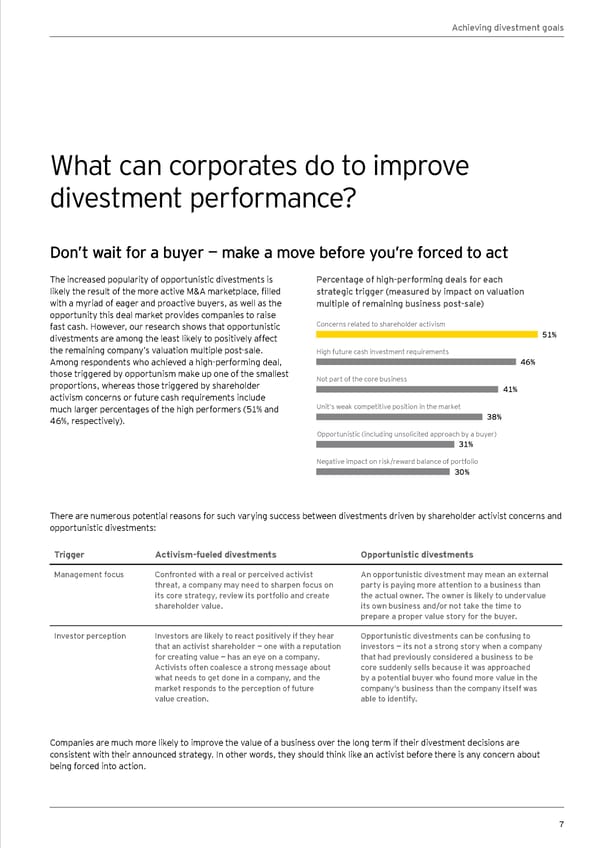Achieving divestment goals What can corporates do to improve divestment performance? Don’t wait for a buyer — make a move before you’re forced to act The increased popularity of opportunistic divestments is Percentage of high-performing deals for each likely the result of the more active M&A marketplace, filled strategic trigger (measured by impact on valuation with a myriad of eager and proactive buyers, as well as the multiple of remaining business post-sale) opportunity this deal market provides companies to raise fast cash. However, our research shows that opportunistic Concerns related to shareholder activism divestments are among the least likely to positively affect 51% the remaining company’s valuation multiple post-sale. High future cash investment requirements Among respondents who achieved a high-performing deal, 46% those triggered by opportunism make up one of the smallest Not part of the core business proportions, whereas those triggered by shareholder 41% activism concerns or future cash requirements include much larger percentages of the high performers (51% and Unit’s weak competitive position in the market 46%, respectively). 38% Opportunistic (including unsolicited approach by a buyer) 31% Negative impact on risk/reward balance of portfolio 30% There are numerous potential reasons for such varying success between divestments driven by shareholder activist concerns and opportunistic divestments: Trigger Activism-fueled divestments Opportunistic divestments Management focus Confronted with a real or perceived activist An opportunistic divestment may mean an external threat, a company may need to sharpen focus on party is paying more attention to a business than its core strategy, review its portfolio and create the actual owner. The owner is likely to undervalue shareholder value. its own business and/or not take the time to prepare a proper value story for the buyer. Investor perception Investors are likely to react positively if they hear Opportunistic divestments can be confusing to that an activist shareholder — one with a reputation investors — its not a strong story when a company for creating value — has an eye on a company. that had previously considered a business to be Activists often coalesce a strong message about core suddenly sells because it was approached what needs to get done in a company, and the by a potential buyer who found more value in the market responds to the perception of future company’s business than the company itself was value creation. able to identify. Companies are much more likely to improve the value of a business over the long term if their divestment decisions are consistent with their announced strategy. In other words, they should think like an activist before there is any concern about being forced into action. 7
 Global Corporate Divestment Study Page 6 Page 8
Global Corporate Divestment Study Page 6 Page 8